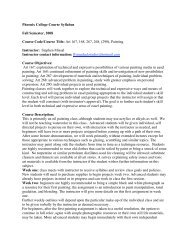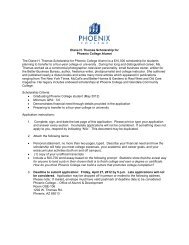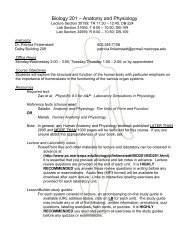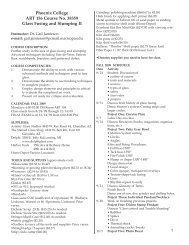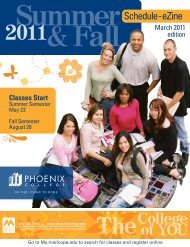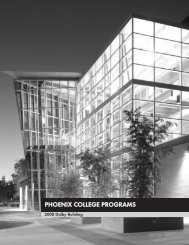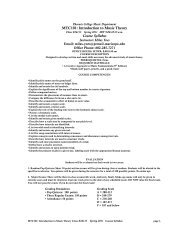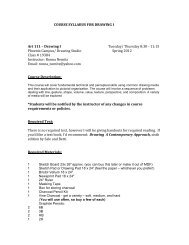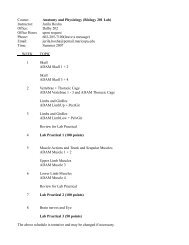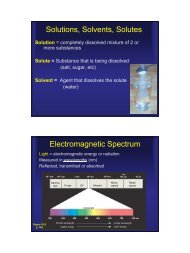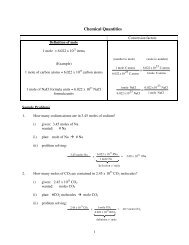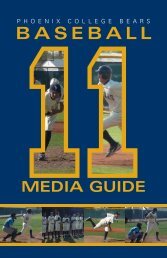Phoenix College Catalog 2009-10
Phoenix College Catalog 2009-10
Phoenix College Catalog 2009-10
Create successful ePaper yourself
Turn your PDF publications into a flip-book with our unique Google optimized e-Paper software.
<strong>Phoenix</strong> <strong>College</strong> <strong>2009</strong>–20<strong>10</strong> CATALOG | 261<br />
ECH288<br />
Community Resources and Referral<br />
1 credit(s) 1 period(s) lecture<br />
(Not offered every semester)<br />
Survey of current community agencies,<br />
resources, and support groups for a variety<br />
of child and family needs. Considers<br />
appropriate procedures for referral, handling<br />
of information, confidentiality and follow up.<br />
Prerequisites: None.<br />
ECN – Economics<br />
ECN211<br />
Macroeconomic Principles<br />
3 credit(s) 3 period(s) lecture<br />
A descriptive analysis of the structure and<br />
functioning of the American economy.<br />
Emphasis on basic economic institutions<br />
and factors that determine national income<br />
and employment levels. Consideration given<br />
to the macroeconomic topics of national<br />
income, unemployment, inflation and<br />
monetary and fiscal policies. Prerequisites:<br />
None.<br />
ECN212<br />
Microeconomic Principles<br />
3 credit(s) 3 period(s) lecture<br />
Microeconomic analysis including the theory<br />
of consumer choice, price determination,<br />
resource allocation and income distribution.<br />
Includes non-competitive market structures<br />
such as monopoly and oligopoly; and the<br />
effects of government regulation. Selected<br />
issues examined. Prerequisites: None.<br />
EDU – Education<br />
EDU<strong>10</strong>5<br />
Substitute Teacher Training<br />
2 credit(s) 2 period(s) lecture + lab<br />
Survey of issues important to substitute<br />
teaching in Arizona. Discussion of<br />
certification, professional behavior, and<br />
classroom techniques. In school practicum<br />
provides hands-on application of concepts.<br />
Prerequisites: None.<br />
EDU161<br />
Family Centered Services<br />
3 credit(s) 3 period(s) lecture<br />
Specific techniques and strategies available<br />
to families that enhance interactions with a<br />
special needs child. An overview of dynamics<br />
of family-child and parent-child relations.<br />
Legislation affecting children with special<br />
needs. Prerequisites: None.<br />
EDU170<br />
Disaster Management for Schools<br />
3 credit(s) 3 period(s) lecture<br />
School preparedness planning for community<br />
disasters and major school crises. Addresses<br />
preparedness, response, and recovery.<br />
Creation of disaster/crisis management plan.<br />
Prerequisites: None.<br />
EDU206<br />
Classroom Strategies For the<br />
Exceptional Learner<br />
3 credit(s) 3 period(s) lecture + lab<br />
Practical experience with exceptional<br />
learners in the classroom. Understanding of<br />
and teaching strategies for exceptional<br />
learners with mild/moderate mental<br />
retardation, learning disabilities, emotional<br />
disabilities, physical disabilities, and/or other<br />
health-related impairments. Prerequisites:<br />
EDU222.<br />
EDU208<br />
Introduction to Structured English<br />
Immersion<br />
1 credit(s) 1 period(s) lecture<br />
Emphasis on understanding English<br />
Language Learners (ELL) in the mainstream<br />
classroom. Brief history, culture, theory,<br />
methods, and an introduction to both the<br />
English Language Proficiency (ELP)<br />
standards and the state-mandated English<br />
language proficiency assessment test<br />
covered. Includes review of alternative<br />
methods of assessment. Prerequisites:<br />
None.<br />
EDU2<strong>10</strong><br />
Methods For Working With the ESL<br />
Student<br />
3 credit(s) 3 period(s) lecture<br />
Strategies for working with the ESL student<br />
in language arts, science, math, social<br />
studies, and culture. Components of<br />
curriculum content and tutoring techniques<br />
emphasized. Designed for pre-baccalaureate<br />
students. Prerequisites: EDU225, or<br />
permission of instructor. Course Notes:<br />
Requires fifteen (15) hours of field experience<br />
in an elementary or secondary classroom<br />
environment.<br />
EDU211<br />
Methods For Working With the<br />
Bilingual Student<br />
3 credit(s) 3 period(s) lecture<br />
Strategies for working with the bilingual<br />
student in language arts, science, math,<br />
social studies, and culture. Components of<br />
bilingual curriculum content and tutoring<br />
techniques emphasized. Designed for prebaccalaureate<br />
students. Prerequisites:<br />
EDU225 and proficiency in Spanish. Course<br />
Notes: Requires fifteen (15) hours of field<br />
experience in an elementary or secondary<br />
classroom environment.<br />
EDU212<br />
English as a Second Language For<br />
Bilingual Students<br />
3 credit(s) 3 period(s) lecture<br />
Techniques for working with English as a<br />
Second Language (ESL) students in bilingual<br />
settings. Covers multiple intelligences<br />
theory and second-language acquisition<br />
theories. Methods, materials and programs<br />
appropriate for bilingual students<br />
emphasized. Designed for pre-baccalaureate<br />
students. Prerequisites: EDU225.<br />
EDU213<br />
Reading and Writing Strategies in an<br />
ESL/Bilingual Setting<br />
3 credit(s) 3 period(s) lecture<br />
Theories and terminology in English as a<br />
Second Language (ESL). Second-language<br />
acquisition and reading emphasized.<br />
Techniques, strategies, and learning<br />
activities as well as reading comprehension<br />
and writing strategies also covered.<br />
Designed for pre-baccalaureate students.<br />
Prerequisites: EDU225.<br />
EDU216<br />
Introduction to Assessment of<br />
Linguistically Diverse Learners<br />
3 credit(s) 3 period(s) lecture<br />
Introduction to the assessment of Limited<br />
English Proficient (LEP) students and<br />
programs. Identification, exiting, and ongoing<br />
assessment of student learning as well as<br />
legal issues and historical perspectives<br />
covered. Connection between assessment<br />
and instruction included. State standards<br />
emphasized. Designed for pre-baccalaureate<br />
students. Prerequisites: EDU225.<br />
EDU221<br />
Introduction to Education<br />
3 credit(s) 3 period(s) lecture<br />
Overview of the historical, political,<br />
economic, social, and philosophical factors<br />
that influence education and make it so<br />
complex. Opportunity for students to assess<br />
their interest and suitability for teaching.<br />
Prerequisites: None. Course Note:<br />
Requires minimum of 30 hours of field<br />
experience in elementary or secondary<br />
classroom environment.<br />
EDU222<br />
Introduction to the Exceptional Learner<br />
3 credit(s) 3 period(s) lecture<br />
Overview of the exceptional learner, one<br />
who differs from the average or normal,<br />
with emphasis on factors relating to current<br />
practices, identification, characteristics, and<br />
educational adaptations. Issues related to<br />
mildly disabled, severely disabled,<br />
emotionally and behaviorally disordered,<br />
mentally retarded, and gifted students.<br />
Includes school-based practicum.<br />
Prerequisites: None.<br />
EDU225<br />
Foundations for Serving English<br />
Language Learners (ELL)<br />
3 credit(s) 3 period(s) lecture<br />
Rationale for and current educational and<br />
legal issues for English Language Learners<br />
(ELL). Comparison and evaluation of various<br />
types of language educational models<br />
including Structured English Immersion<br />
(SEI), English as a Second Language (ESL)<br />
and bilingual. Prerequisites: None. Course<br />
Note: Approved school-based practicum is<br />
required.<br />
Course Descriptions



